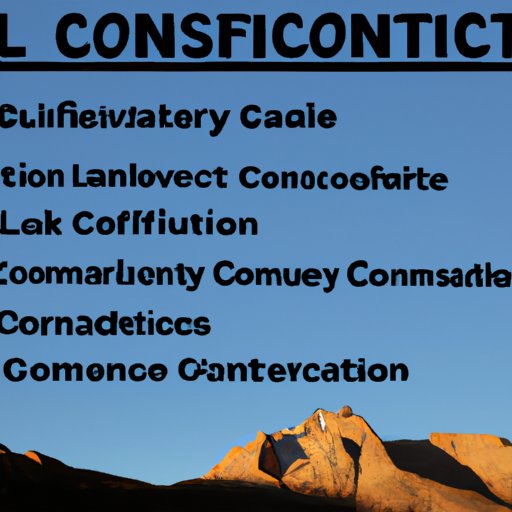Introduction
Forming a limited liability company (LLC) in Colorado is an important decision that can have far-reaching implications for your business. An LLC provides many advantages, including limited liability protection, flexible management structure, and potential tax savings. This article will provide a step-by-step guide on how to start an LLC in Colorado, as well as what you need to know before getting started. We’ll also discuss the documents required, naming requirements, and fees associated with setting up an LLC.
Step-by-Step Guide to Forming an LLC in Colorado
Forming an LLC in Colorado is relatively straightforward, but there are several steps you need to take to ensure everything is done correctly. Here is a step-by-step guide to help you get started:
1. File Articles of Organization
The first step to forming an LLC in Colorado is to file Articles of Organization with the Colorado Secretary of State. This document outlines basic information about your LLC, such as the name, address, purpose, and member information. The filing fee is $50, and you can submit it online or by mail. You can also hire a registered agent to help you with the process.
2. Appoint a Registered Agent
You must appoint a registered agent in order to form an LLC in Colorado. A registered agent is responsible for receiving legal documents on behalf of your LLC. You can appoint yourself or an individual within your LLC, but it must be someone who is available during normal business hours. Alternatively, you can hire a professional registered agent service.
3. Create an Operating Agreement
An operating agreement is an internal document that sets out the rules and regulations of your LLC. It outlines the roles and responsibilities of each member, as well as how profits and losses will be distributed. It is not legally required, but it is highly recommended for LLCs with more than one member. You can create your own operating agreement or hire a lawyer to help.

What You Need to Know Before Starting an LLC in Colorado
Before you start the process of forming an LLC in Colorado, there are a few things you need to consider. First, you should decide which type of business structure is best for your company. There are four main types of business structures in Colorado: sole proprietorships, partnerships, corporations, and LLCs. Each has its own advantages and disadvantages, so it’s important to do your research and choose the right one for your business.
It’s also important to understand the pros and cons of forming an LLC in Colorado. One of the biggest benefits of an LLC is limited liability protection, which means that the members of the LLC are not personally liable for the debts and liabilities of the company. Additionally, LLCs offer flexibility when it comes to management structure and taxation. However, there are some drawbacks as well, such as higher filing fees and potential double taxation.
Finally, you should be aware of the tax considerations involved in forming an LLC in Colorado. LLCs are considered “pass-through entities” for federal income tax purposes, meaning the profits and losses of the LLC pass through to the members of the LLC and are taxed on their personal income taxes. LLCs are also subject to state taxes, including sales and use taxes, corporate income taxes, and franchise taxes.
What Documents Are Required to Start an LLC in Colorado?
In order to form an LLC in Colorado, you will need to file certain documents with the Secretary of State. These documents include Articles of Organization, an Operating Agreement, and information about your Registered Agent. The Articles of Organization must include the name of the LLC, the address of the principal office, the name and address of the registered agent, and the purpose of the LLC. The Operating Agreement should outline the roles and responsibilities of each member, as well as how profits and losses will be distributed.
How to Choose a Name for Your Colorado LLC
Choosing a name for your LLC is an important part of the formation process. The name must be distinguishable from any other entity on file with the state, and it must include either the words “limited liability company” or the abbreviation “LLC.” Additionally, the name cannot contain any restricted words, such as “bank” or “insurance.” You can search for available names on the Secretary of State’s website.
What Fees Are Involved When Setting Up an LLC in Colorado?
There are several fees associated with setting up an LLC in Colorado. The filing fee for the Articles of Organization is $50. Additionally, LLCs must pay an annual report fee of $10. There may also be fees associated with hiring a professional registered agent and creating an Operating Agreement. Lastly, LLCs may be subject to state taxes, depending on the type of business and the amount of revenue generated.

Benefits of Forming an LLC in Colorado
Forming an LLC in Colorado offers many benefits for businesses. The most significant benefit is limited liability protection, which means that the members of the LLC are not personally liable for the debts and liabilities of the company. Additionally, LLCs offer flexibility when it comes to management structure and taxation. Finally, LLCs may be eligible for certain tax advantages, such as pass-through taxation and the ability to deduct business expenses.
Conclusion
Forming an LLC in Colorado can be a great way to protect your personal assets and take advantage of potential tax savings. There are several steps you need to take to form an LLC, including filing Articles of Organization, appointing a registered agent, creating an Operating Agreement, and choosing a name. Additionally, there are various fees associated with setting up an LLC, including filing fees, annual fees, and potential state taxes. If you’re looking for an effective way to manage your business, forming an LLC in Colorado could be the right choice for you.
For more information on how to start an LLC in Colorado, you can visit the Colorado Secretary of State website or consult a lawyer. With the right planning and preparation, you can be well on your way to forming a successful LLC in Colorado.
(Note: Is this article not meeting your expectations? Do you have knowledge or insights to share? Unlock new opportunities and expand your reach by joining our authors team. Click Registration to join us and share your expertise with our readers.)
